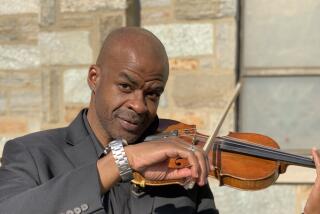Playing With Words : LECTIONARY OF MUSIC An Entertaining Reference and Reader’s Companion <i> by Nicolas Slonimsky (McGraw-Hill: $24.95; 521 pp.) </i>
- Share via
Just when it seems that Nicolas Slonimsky has dictionared and lexicographed himself to oblivion along comes another of the mischievous musicologist’s informative source books.
As before, readers will be hard put to imagine that the 95-year-old wonder--that’s right, 95--still commands the drive and stamina, not to mention wit and sundry powers of an erudite sleuth, to go on authoring his beloved tomes.
Here is one encyclopedist who never runs out of material--nor the ability to make scholarship entertaining. “Lectionary of Music” follows on the heels of Slonimsky’s long-awaited autobiography, which he had wanted to entitle “Failed Wunderkind: A Rueful Autopsy.” (His publishers--less original, less antic and less teasing than he--insisted on the blandly generic “Perfect Pitch”; Nick laughingly complains now that unknowing booksellers search for it among their baseball listings!)
Here is also the man, long a Los Angeles resident, whose immense linguistic and musical gifts show him to be more than an astonishing documentarian. In his nine decades he can claim kudos as a trailblazing conductor of new music--leading the Philharmonic at the Hollywood Bowl in the ‘30s--an avant-garde composer, a virtuoso pianist, a professor of Slavic languages at Harvard, a lecturer for the State Department. In addition, he is a walking compendium of music written in the 1900s and has even contributed a cache of scores to the Library of Congress.
Curiously, he moved out of the primary creativity spotlight 40 years ago--seeming to prefer the calling of observer-scribe. Born in czarist St. Petersburg to a family that consciously bred great minds over many generations, Slonimsky recognizes the inevitable influence of his clan; indeed he claims to have suffered from it. (“My ancestors devised useless languages, concocted futile mathematical formulae , invented devices for which no one could conceive the slightest employment.”). In truth, his great-grandfather was renowned for the invention of a highly sophisticated machine regarded as a precursor of the computer; a grandfather gave the world its first telegraph but never followed through with a patent.
He also claims to have suffered, if we can understand the verb in this context, from a mother who declared his genius when he reached the considerable age of 6. However, the real and insidiously negative messages came by way of her attempt to protect him “from the horrible fact of our Jewishness.”
Whatever deficit of pride one can attribute to this unsuccessfully hidden closet skeleton, Slonimsky does not outwardly reflect it. Nothing appears to have quelled his zest for scholarly achievement and tracking the accomplishments of others. But when he jokingly refers to himself as a “failed Wunderkind,” music historians must be somewhat sympathetic to his point of view.
No one could overestimate, though, his powers of detente. Long before the word glasnost entered our working vocabulary, Slonimsky, a naturalized American, was being regularly invited to the Soviet Union--believing he became a “persona grata” by way of publishing the biographies of 106 Soviet composers who might otherwise have gone unidentified in the West.
Like the best of contemporary music guides the “Lectionary”--a Slonimskyism combining dictionary and lexicography--recognizes no delimiters of classification. Open any page and you’ll find listings of commercial icons and pop figures lined up with the stalwarts of our serious music literature.
Organized alphabetically, the volume begins each section with a psycho-philosophic discussion of the various key signatures. D-minor, for instance, is “the key of repressed passion” exemplified by Beethoven’s Ninth Symphony, although with it Mahler’s Sixth “expresses joy in the presence of nature.”
But B-flat major “can claim to be the key of the universe,” writes Slonimsky. “Most machines of modern industry--such as electric motors, fans and washing machines--buzz, whir and hum on the 60-cycle B-flat.”
Slonimsky has a zeal for searching out obscure word origins. Most of us are content to chuckle over Charles Schulz’s comic strip, “Peanuts,” never realizing that the character Linus can be traced to his namesake from Greek mythology. Thanks to Slonimsky we now know that it was Linus who tried to teach music to Hercules, only to be slain by his pupil with his own lyre in a fit of rage over Linus’ attempt to correct a musical error made during a lesson. The last thing one would expect this compulsive researcher to do is curb his voracious appetite for investigation by observing boundaries. In the true interdisciplinary spirit, he leads us to objets trouves or “found objects,” identifying artist Marcel Duchamp’s urinal from a men’s lavatory as the first such to be exhibited. Slonimsky traces that milestone to Andy Warhol, who “managed to create a sensation by selling a Brobdingnagian representation of a Campbell’s soup can for a reputed sum of $70,000.”
If the author makes one little mistake -- he dates the premiere of Morton Gould’s “Fall River Legend” as April 22, 1947 when the Agnes de Mille ballet opened one year later -- it’s entirely forgivable and human.
More to Read
Sign up for our Book Club newsletter
Get the latest news, events and more from the Los Angeles Times Book Club, and help us get L.A. reading and talking.
You may occasionally receive promotional content from the Los Angeles Times.








